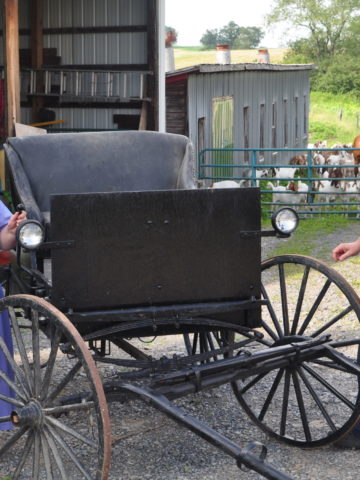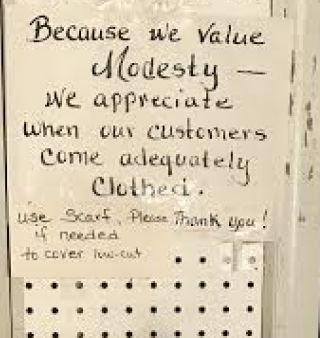The bishop occupies a central role in the operation of the Amish church. There is no "Amish pope" equivalent. There is no charismatic central Amish authority in charge of the entire church like there are in other denominations and religions. In the Amish church, the top authority is the local Amish bishop. The Amish bishop in one church, has no authority beyond the bounds of his local congregation.

Here are some additional thoughts and points about Amish bishops:
⛪ How Are Amish Bishops Selected?
Like so many customs in the Amish church, traditions and rules vary. The way the bishop is selected varies from church to church. Usually church members nominate someone in a secret ballot and then there is a final round of voting to make the selection. But the bishop is always male. That is one consistent factor that you will see in every single Amish church. I know of no Amish church that has a woman bishop, or a woman in any ministerial or administrative role.
Usually, a bishop once selected and elected is bishop for life. They could step down from the role, if health dictates it, though. The Amish bishop usually has a couple of ministers or deacons to serve as assistants.
🔨 Being Bishop Is A Lot of Work
I was attending an Amish church once when a bishop was going to be selected, and an Amish man that I knew was a candidate and, interestingly, he really didn’t want to be selected.
"Oh, I hope I don't get it," he muttered to me a couple of times during the service. And his wife seemed to agree.
I suppose if chosen to be bishop, he could have declined. I can't imagine someone could be forced into the role. But being chosen is an honor and declining would be rare.
I don’t think his wife wanted him being elected either. There is a lot of responsibility that goes with the role of bishop. It’s a 24/7 on call job with no pay.
💰 No Paycheck For The Bishop
That’s another consistency that you find across all Amish churches. I know of no Amish bishop that gets paid for the position. It's a lay position with no formal training and the bishop has to support himself through a typcial job, such as farming, carpentry, or owning a business.

Interestingly, often you’ll see that the Amish bishop lives in one of the nicest homes in a church congregation and is perhaps a little bit more affluent than other people in the church, but that has nothing to do with receiving money from being a bishop. It’s more that the Amish are like everyone else, they often gravitate towards the more successful as their leaders. That’s all.
While bishops have no formal training, they have to wear many hats: counselor, therapist, rule enforcer, judge, friend, and bookkeeper, sometimes have to keep track of church money matters, or they may farm some of these tasks out.
📋 Variety Among the Bishops
There are ideological differences among bishops. There are more “liberal bishops “and they’re more "conservative bishops." And ideological purity has nothing to do with age. I once met a young candidate for bishop in his early 30s. He was seen as someone who would be as rock solid conservative bishop. The bishop he was replacing was in his 80s and was seen as much more liberal. The bishop in his 80s had to step down for health reasons.
So what if church members find a bishop too authoritarian, conservative, or too liberal, and for their taste? Well, you can move. And many Amish do. Since Amish churches vary so much from church to church (because there is no central "Pope" equivalent to provide doctrinal consistency) you do see families moving often, trying to find an Amish church that is the best "fit" for them.
Another option would be to start a new church. If a group of families felt strongly about the way a church should function or about a technology they'd like to adopt, they can split off and form their own Amish church district and elect a bishop from within their own ranks. It happens all the time.
Often, if an Amish person decides to leave a church and join a new one, they’ll have to show a letter of good standing from the bishop.
This exercise actually is a good protective exercise. It tends to prevent Hollywood type plots from developing where an outsider tries to join and hide out among the Amish. And it keeps unreformed Amish "bad apples." Outsiders, however, can join the Amish and the bishop plays a big role there too.
📋 Does An Amish Bishop Make the Rules?
Amish church members vote on rules and changes. So an Amish bishop doesn't get to make the rules per se. But the bishop does carrry a "platform" with it. So if a bishop really feels strongly about something, if they have powers of persuasion, they can often get church members on board. If the bishop alienates too many of his church members, he will find himself a bishop without a church.
Most Amish churches have internal rules and mechanisms to remove a bishop if an extreme circumstance occurs.
And, being a bishop isn't all work, the bishop has favorite recipes and he loves sharing them with the church!
🤝 Bishops Work With Other Bishops
While there is no central church authority among the Amish, bishops will occasionally band together to work together. They'll form steering committees (one such committee was formed to deal with COVID) to tackle various issues, narrow or broad,so that they can bounce ideas off one another and give the larger Amish faith some broad contours of consistency.
🙋 FAQ Questions About Amish Bishops
Yes, there are no known Amish female church leaders.
An Amish bishop can step down due to health, but generally it is a life appointment.
Most Amish churches with normal, functioning rules and guidelines do have mechanisms for removal in extreme circumstances.





Debra
A few comments to aid in your "Bishop" topic, (Yes, it is for life unless you fail in some major way or your health fails in old age.) coming from an ex-Amish. You mentioned there being ministers and deacons to help the deacon. Generally speaking, the bishop is the leader of the ministerial team. The ministers also preach sermons and are a part of the decision making before things are presented to the church for approval. It is from those already ordained as minister that a bishop is eligible for ordination. The deacons are the ones who handle the financial affairs, assist the bishop in approaching erring church members, involved in church decisions prior to presenting to lay members for approval, etc.
Interestingly, I have never noticed the bishop living in more affluent homes as being the standard. In my experience they have at times even been among the more primitive, possibly they were, as you called them, among the "conservative bishops."
Being the bishop subjects a family to a lot of vulnerability because of the leadership skills required and it can look like a huge responsibility, which is why it isn't the desired position by some. For others it is a sign of being well liked and accepted among the church membership, therefore they desire the calling but don't want to look proud by acknowledging it.
Kevin Williams
Thank you so much, Debra, for those interesting insights. I appreciate you bringing up the sermons too, that was a topic I neglected to bring up!